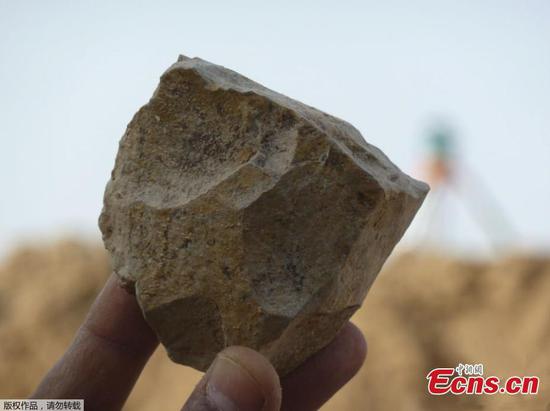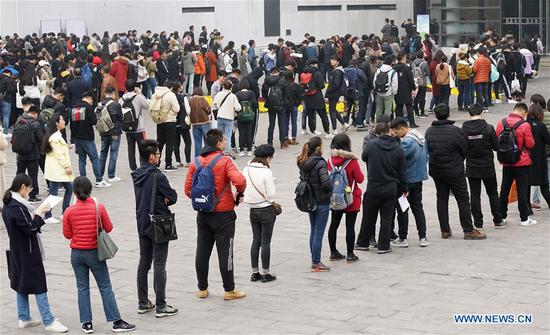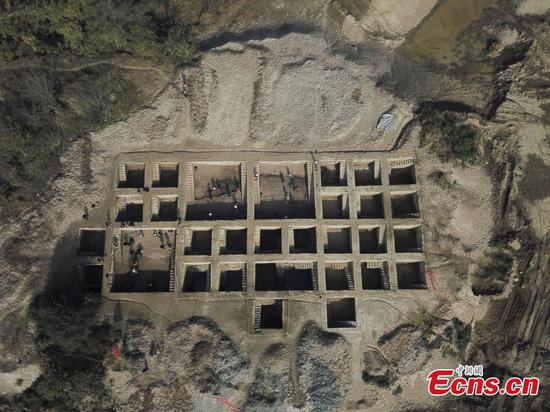
An employee of CNOOC cleans LNG transmission facilities in Qingdao, Shandong Province. (Photo by Yu Fangping/For China Daily)
Issuing more local government bonds next year could be a way to support infrastructure construction funding and offset a likely slowdown in government income, experts said.
At the same time, regulation of local governments' debt expansion could remain unchanged when they face repaying matured loans next year.
Total local government bond issuance may reach 3.9 to 4.4 trillion yuan ($566.5 billion) next year. It will be the key channel to raise fund, and part of this will be used to repay the 1.32 trillion yuan in matured debt, according to a recent research by China Securities.
Nearly 1.32 trillion yuan is due to be repaid by local governments next year, compared with the total matured debt of 838.9 billion yuan this year, according to financial information provider Wind Info.
Local governments usually issue both general (on-budget) bonds and special-purpose (off-budget) bonds to repay old debt. This means that bond issuance in 2019 may require a sharp increase to more than 4 trillion yuan, analysts said.
With the country continuing to keep a tight rein on "hidden" fundraising activities of local governments, as well as taming shadow banking, financing pressure will shift more to bond issuance, they added.
Several provincial and city governments have been calculating the amount of money they will need to support next year's infrastructure construction projects, which policymakers will rely on to stabilize economic growth amid a gloomier outlook for 2019. The National People's Congress, the country's top legislative body, will discuss and decide the annual local government bond quota in early March.
Former finance minister Lou Jiwei said that room for further fiscal expansion is limited, as the debt level is already high and local government income has fallen.
"It may not be right to relaunch massive infrastructure construction, as the leveraging level will rise further, thus extending risks, and the consequences of a systemic crisis will be even worse," he said.
Local governments' income growth has slowed remarkably this year. Some provinces and municipalities, especially those that rely heavily on the manufacturing industry and property investments, may see greater pressure to widen fiscal deficits next year, according to experts.
For example, the Tianjin municipal government's income dropped by 20.5 percent year-on-year in the first nine months of this year, showed by the finance department of Tianjin's local government. Its income fell for 11 consecutive months from November last year.
"The implementation of tax-cut policies and adjustment of the fiscal structure has significantly reduced Tianjin's fiscal income this year," said a local government bond rating report from China Lianhe Credit Rating Co.
Such income in the Inner Mongolia autonomous region has also fallen significantly this year-down by 9.3 percent year-on-year by the end of August. In Hunan province, while the local government's revenue increased by 1.52 percent in the first eight months, this compared with 7.18 percent growth in the same period last year, according to data from the local governments.
The Ministry of Finance announced the first monthly decline in fiscal revenue for this year in October. It retreated by 3.1 percent from a year earlier to 1.57 trillion yuan, mainly due to a substantial year-on-year drop in tax income of 5.1 percent, which came amid the strongest wave of tax cuts in a number of years.
A more aggressive tax reduction plan was announced by the finance minister and the tax authority last month, so analysts expect total tax income will continue to slow next year, resulting in reduced fiscal income.
Andrew Tilton, an economist with Goldman Sachs, said, "China is likely to ease fiscal policy further in 2019," in terms of further tax reduction and strengthened fiscal expenditure.
"Although the formal on-budget deficit target will not move much-perhaps up to 3 percent (next year) from 2.6 percent this year, we expect to see the government mobilize 'idle' savings, or fiscal deposits, and further increase quotas for off-budget special local government bonds to drive infrastructure spending in 2019," Tilton said.
Lu Ting, an economist with Nomura Securities, said if there is no expansion of local governments' financial sources, "the ongoing credit down-cycle will extend into the spring due to rising repayment pressures and widening credit spreads".
Local governments issued bonds worth 4.06 trillion yuan in the first 10 months of this year, according to the Finance Ministry.
Fiscal spending increased nationally by 8.2 percent in October to 1.2 trillion yuan, while the total for January to October, which rose by 7.6 percent to 17.5 trillion yuan, comprised 83.6 percent of the budget for the year.


















































